 "This storm [Hurricane Maria] is no longer killing Americans," an exasperated Rachel Maddow exclaimed on MSNBC in mid-October. "The federal government's response to this storm is now killing Americans."
"This storm [Hurricane Maria] is no longer killing Americans," an exasperated Rachel Maddow exclaimed on MSNBC in mid-October. "The federal government's response to this storm is now killing Americans."
Setting aside Donald Trump's own self-assessment that his government's response was a "10" out of 10 --- that it couldn't have been better --- actual facts reveal otherwise.
Congress need not await the outcome of Special Counsel Robert Mueller's investigation into whether the Trump campaign conspired with Russia in the 2016 election, before determining if President Donald J. Trump should be impeached.
The phrase "high crimes" that appears in the Impeachment Clause of the U.S. Constitution, according to the Constitution Society, "refers to those punishable offenses that only apply to high persons, that is, to public officials, those who, because of their official status, are under special obligations that ordinary persons are not under, and which could not be meaningfully applied or justly punished if committed by ordinary persons."
It is an impeachment threshold that can be found in President Trump's reckless and callous disregard of his special obligation to protect the lives and safety of the 3.6 million American citizens who reside in the Commonwealth of Puerto Rico --- a U.S. territory that the President formally recognized, as early as September 21, as the site of a "major disaster"...
President's duty to protect American lives
Relying upon the language of the Presidential Oath of Office --- ("I do solemnly swear...that I will faithfully execute the Office of the President of the United States, and will to the best of my Ability, preserve, protect and defend the Constitution of the United States") --- Michael Zenko, writing for Foreign Affairs, took exception* to the successive assertions made by George W. Bush and Barack Obama that a President's principal responsibility is to protect the lives and safety of Americans.
Steven Aftergood of the Federation of American Scientists appeared to agree with that aspect of Zenko's assertion. "The supreme responsibility of the President," he told PBS NewsHour, "is to protect our system of government, not the safety of individuals or even their physical security."
With all due respect, Aftergood's narrow interpretation of the Oath of Office does violence to the original intent of the framers when they adopted the social contract that became known as the United States Constitution.
Our nation's Founders were products of the "Age of Enlightenment". Thomas Jefferson "used the thoughts first penned by John Locke while writing the Declaration of Independence".
Locke, according to Law Prof. Steven Heyman, was of the view that because governments are established for the "mutual Preservation" of the lives of their citizens, governments are "obliged" to secure the lives of their citizens. Thus, the Declaration of Independence observes:
Both the 5th and 14th Amendments to the U.S. Constitution expressly provide that no person shall "be deprived of life, liberty, or property without due process of law." This standard applies irrespective of whether the government occasions the "deprivation of life" intentionally or through callous indifference and neglect. To suggest otherwise is to undermine the very foundation of our national existence.
Catastrophic storm
Issues concerning the dangers of climate science denial aside, this is not to remotely suggest that this President should be impeached solely by reason of the Puerto Rican deaths directly occasioned by the initial, devastating Hurricane Maria, itself. However, the scope of a President's duty to protect American lives in the aftermath of the storm is informed by the extent of the devastation left behind by its parting winds and rain. The reality of the danger to health and safety defines the scope of the recovery efforts needed to minimize the loss of life.
Almost from the moment Hurricane Maria made landfall on September 20, Trump knew or should have known, based on available information, that the island's residents faced a life-threatening catastrophe. "It was as if a 50- to 60-mile-wide tornado raged across Puerto Rico, like a buzz saw," according to Jeff Weber, a meteorologist with the National Center for Atmospheric Research.
"From a meteorological standpoint, Maria was nearly a worst-case scenario for the territory: The center of a huge, nearly Category 5 hurricane made a direct hit on Puerto Rico, lashing the island with wind and rain for longer than 30 hours," Robinson Meyer reported in The Atlantic, before adding context. Hurricane Maria, Meyer noted, slammed into Puerto Rico a scant two weeks after the eye of Hurricane Irma "skirted" just north of San Juan. Irma killed four people in Puerto Rico, leaving approximately 2/3 of the island's 3.6 million residents without power and about 1/3 with access to potable water.
The extent to which Maria compounded these problems is reflected by the fact, revealed by Business Insider, that three weeks after the storm ripped through the island, "about half of Puerto Rico's residents lacked access to drinking water and 95% of the island was without power," according to statistics that FEMA initially "removed"; then, after public protest, "restored" to its website.
Science informs the gravity of those statistics. "After 3 days, you need water or you'll perish," according to Live Science.
Maria did not merely produce a "disaster", according to Meyer. It was what Prof. Tricia Wactendorf described as a "catastrophic event" in which "most, if not all, of the built environment is destroyed." Such widespread destruction, far exceeding anything that occurred on the Continental U.S. during the storms, both Irma and Harvey that preceded it just days earlier, significantly impaired the ability of local officials to reach affected areas. This not only meant that many citizens living in remote areas lacked access to food, shelter, potable water and electricity. They also lacked access to hospitals. And, even in the island's relatively accessible capital of San Juan, the sustained loss of electricity adversely impacted the ability of that city's hospitals to provide effective care.
On the same day that Maria struck, Domingo Cruz Vivaldi, an administrator of San Jorge Children's Hospital in San Juan, announced over NPR that he anticipated the emergency generators would fail in a matter of days.
The combination of lack of access to potable water and functioning hospitals informed the federal government, and by extension, the President, of another acute risk --- the danger posed to the many U.S. citizens who could be seen, on televised images, retrieving life-sustaining water from mountain streams and other potentially dangerous sources. This activity, according to the Center for Disease Control (CDC), is fraught with the risk of infections diseases occasioned by consumption of waterborne bacteria. The known hazards include Leptospirosis, a disease caused by a bacteria that enters bodies of water via the urine of infected animals. If left untreated, Leptospirosis "can lead to kidney damage, meningitis (inflammation of the membrane around the brain and spinal cord), liver failure, respiratory distress, and even death," according to the CDC.
Thus, the gravity of the storm, itself, scientifically informed the President, and those to whom he delegated authority to manage the federal government's emergency response, as to both the urgency and massive scope of the federal assistance reasonably required to prevent the unnecessary loss of American lives on the island.
Any doubts the President and other federal officials may have entertained about what was needed should have been eliminated on Sept. 29 when San Juan Mayor Carmen Yulín Cruz appeared on MSNBC's Rachel Maddow Show.
"My people are dying here," the exhausted and emotionally wrought mayor told Maddow. Cruz laid out in detail the gravity of the life-threatening problems occasioned by Hurricane Maria's devastating impact. She also furnished a damning description of the impotence and bureaucratic inefficiencies of the federal government's woefully deficient response. She was especially critical of FEMA, which, she charged, appeared to be more concerned with filling out forms than saving lives.
The federal government's response was not merely deficient but tardy. Despite the well-publicized warning about the inadequacy of hospital treatment on the island due to a lack of electricity and fuel shortages, the U.S. Navy delayed a full eight days before deploying its 1,000-bed hospital ship, the USNS Comfort, to the Port of San Juan. It did so only after former Secretary of State Hillary Clinton, together with 270,000 petition-signing Americans, publicly urged the President to deploy the ship.
'The Wrath of Don'
Rather than accept the validity of Cruz's criticism, our infamously dishonest and vindictive President disparaged the hurricane victims in Puerto Rico as "politically motivated ingrates."
For the raging narcissist, any criticism is a personal affront that must be challenged on Twitter.
"Such poor leadership by the Mayor of San Juan, and others in Puerto Rico, who are not able to get their workers to help," Trump Tweeted. "They want everything to be done for them when it should be a community effort."
The Donald even had the temerity, upon visiting the island on Oct. 3, to chastise the Puerto Rican hurricane victims for "throwing our budget out of whack." Instead of offering so much as a comforting word, Trump told Puerto Ricans that they "have to give us more help." He brushed aside the life-threatening gravity of Maria's impact on the island, noting that, as of Oct. 3, there had only been 16 "confirmed deaths."
Within hours after he'd left the island, the official death toll was increased to 34. Days later, an independent analysis by Vox determined the number was likely far more than 400...
The Vox statistics were cited during a must watch Oct. 11 segment of MSNBC's Rachel Maddow Show. (See video below). During the show, Maddow did much more than expose the lie in Trump's boasts about the "amazing" recovery effort. She also detailed the deadly consequences of the federal government's woefully inept response that, among other things, had left so many without access to safe drinking water for weeks after the storm. Many are still struggling for clean water, a full month after the storm came ashore.
An unknown number of citizens, forced to drink from contaminated creeks and streams to survive, contracted Leptospirosis. While we cannot know how many of the island's U.S. citizens have contracted this "treatable" disease, Maddow revealed there had already been four (4) "confirmed deaths" attributed to Leptospirosis infections.
Maddow also cited a U.S. Environmental Protection Agency (EPA) News Release warning against drinking from toxic water sources...
(Good advice. Unfortunately, since 95% of the island lacked access to electricity at the time, it's doubtful the desperate U.S. citizens residing in remote areas of Puerto Rico will receive the EPA's online warning.)
One day after Maddow's damning broadcast, on Oct. 12, we experienced what Brad Friedman aptly described as "The Wrath of Don." Trump Tweeted: "We cannot keep FEMA, the Military & the First Responders, who have been amazing (under the most difficult circumstances) in P.R. forever!"
Later, on Oct. 12, Maddow offered a follow-up segment where she observed: "This storm is no longer killing Americans. The federal government's response to this storm is now killing Americans." Shockingly, she revealed that, as of Oct. 10, with Puerto Rico's hospitals still struggling to keep the lights on, only eight (8) of the USNS Comfort's 1,000 beds were occupied by Puerto Rican patients --- this, "while people were dying of treatable infections at the hospitals on the island," according to Maddow.
Manslaughter
The President, along with those to whom he delegated authority to manage the emergency in Puerto Rico, such as Federal Emergency Management Agency (FEMA) Director Brock Long, occupy positions of public health responsibility in Puerto Rico that are remarkably analogous to that which was occupied by Nick Lyon, the Director of Michigan's Department of Health and Human Services with respect to the Flint water crisis.
Lyon, according to The New York Times, allegedly failed to timely warn Flint residents of an outbreak of Legionnaires' disease linked to their contaminated supply of drinking water. At one point, Lyon, according to court documents, callously stated that "he can't save everyone" and that "everyone has to die of something."
Lyon, the Times reports, has been "charged with involuntary manslaughter and misconduct in office, felonies that could lead to as much as 20 years in prison."
As explained by FindLaw, "Involuntary manslaughter usually refers to an unintentional killing that results from recklessness or criminal negligence." There are three elements to the crime: "1. Someone was killed as a result of the defendant's actions; 2. The act either was inherently dangerous to others or done with reckless disregard for human life; 3. The defendant knew or should have known his or her conduct was a threat to the lives of others."
In this instance, Americans are unnecessarily dying because of a President's failure to fulfill his solemn duty to see that those measures reasonably necessary to prevent their deaths are undertaken. As President, Trump has access to a vast array of information. Indeed, his responsive Tweets reveal that he had acquired the information provided by San Juan's mayor when she detailed the deficiencies of the federal government's response and the fact that people were dying because of it. Thus, Trump knew or should have known about the woefully inadequacies of his administration's response posed a "threat to the lives of others." Yet, he not only recklessly ignored these dire warnings, but callously dismissed them as the words of "politically motivated ingrates."
A President's duty to protect American lives is paramount. It is not an excuse for Trump to be either too lazy or uncaring to seek out accurate information or expert assistance from federal agencies, like the CDC. It is certainly not an excuse to suggest, as his Secretary of State reportedly did, that this President is a "moron". If Trump is really too stupid to understand the gravity of the situation, he had no business running for, let alone assuming, the Office of President.
The evidence suggests that one could make a stronger case against Trump for involuntary manslaughter than the cases now pending against Michigan's public health officials with respect to the Flint water crisis. Indeed, if the President ever made good on his vindictive threat to remove all federal assistance from Puerto Rico, we could very well be looking at a far more serious charge. At this stage, with what we now know about the presence of a deadly waterborne disease, the "Wrath of Don" could potentially raise questions about premeditated homicide.
Either way, Trump's reckless disregard for Puerto Rican lives must be seen as a "high crime" and grounds for impeachment. Add it to the list.
The must-watch Oct. 11 segment of the Rachel Maddow Show follows...
 Ernest A. Canning is a retired attorney, author, Vietnam Veteran (4th Infantry, Central Highlands 1968) and a Senior Advisor to Veterans For Bernie. He has been a member of the California state bar since 1977. In addition to a juris doctor, he has received both undergraduate and graduate degrees in political science. Follow him on twitter: @cann4ing
Ernest A. Canning is a retired attorney, author, Vietnam Veteran (4th Infantry, Central Highlands 1968) and a Senior Advisor to Veterans For Bernie. He has been a member of the California state bar since 1977. In addition to a juris doctor, he has received both undergraduate and graduate degrees in political science. Follow him on twitter: @cann4ing


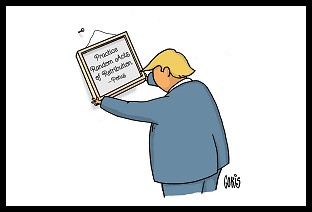 Sunday 'Random Acts of' Toons
Sunday 'Random Acts of' Toons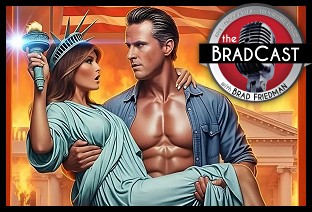 From CA's 'Nuclear Deterrence' Map to Newsom's Trolling to Trump's 'Fascist Theatre' and Beyond: 'BradCast' 8/21/25
From CA's 'Nuclear Deterrence' Map to Newsom's Trolling to Trump's 'Fascist Theatre' and Beyond: 'BradCast' 8/21/25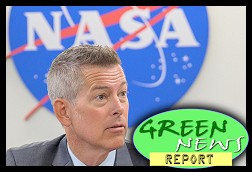 'Green News Report' 8/21/25
'Green News Report' 8/21/25
 On 'Americanism' and Trump's 'Stalinesque' Plot to Whitewash U.S. History: 'BradCast' 8/20/25
On 'Americanism' and Trump's 'Stalinesque' Plot to Whitewash U.S. History: 'BradCast' 8/20/25 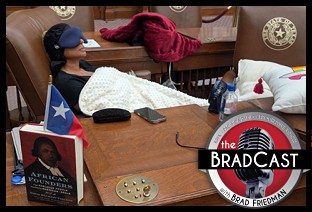 Texas GOP Imprisons Dem State Lawmaker in State House Chamber: 'BradCast' 8/19/25
Texas GOP Imprisons Dem State Lawmaker in State House Chamber: 'BradCast' 8/19/25 'Green News Report' 8/19/25
'Green News Report' 8/19/25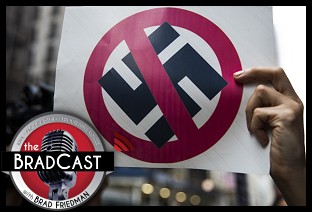 Trump, Nazis and
Trump, Nazis and  Sunday '
Sunday ' Newsom's 'Election Rigging Response Act'; FCC's License Renewal for Sock-Puppeting Sinclair: 'BradCast' 8/14/25
Newsom's 'Election Rigging Response Act'; FCC's License Renewal for Sock-Puppeting Sinclair: 'BradCast' 8/14/25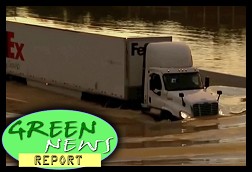 'Green News Report' 8/14/25
'Green News Report' 8/14/25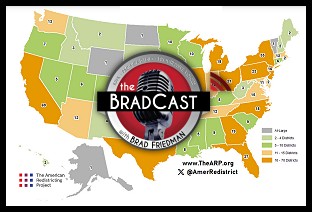 140 New House Reps?: Moving Beyond the Gerrymandering Wars: 'BradCast' 8/13/25
140 New House Reps?: Moving Beyond the Gerrymandering Wars: 'BradCast' 8/13/25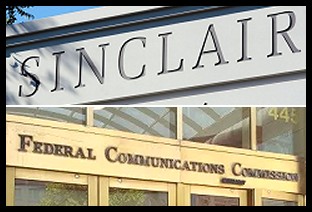 FCC Renews Sinclair TV Licenses Despite Complaint from Petitioner Who Died Waiting
FCC Renews Sinclair TV Licenses Despite Complaint from Petitioner Who Died Waiting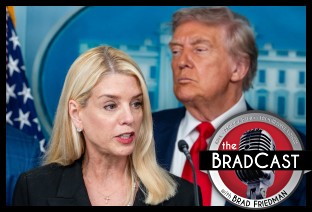 It's Not About the Rule of Law, It's About Authoritarian Control: 'BradCast' 8/12/25
It's Not About the Rule of Law, It's About Authoritarian Control: 'BradCast' 8/12/25 'Green News Report' 8/12/25
'Green News Report' 8/12/25 After Vaccine Cancels, CDC Shooting, Former Officials Want RFK Out: 'BradCast' 8/11/25
After Vaccine Cancels, CDC Shooting, Former Officials Want RFK Out: 'BradCast' 8/11/25 Sunday 'All's Well' Toons
Sunday 'All's Well' Toons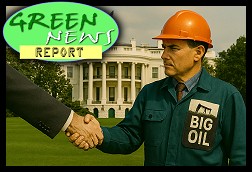 'Green News Report' 8/7/25
'Green News Report' 8/7/25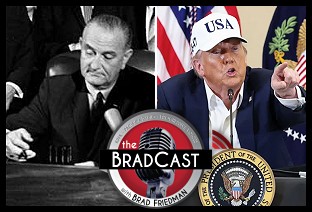 Trump Wars Against Greem Energy, Democracy on VRA's 60th: 'BradCast' 8/7
Trump Wars Against Greem Energy, Democracy on VRA's 60th: 'BradCast' 8/7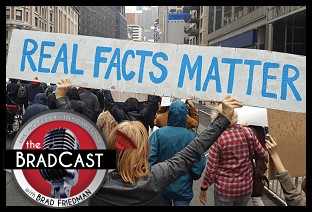 Media Conglomerates Continue Trump Capitulation: 'BradCast' 8/6/25
Media Conglomerates Continue Trump Capitulation: 'BradCast' 8/6/25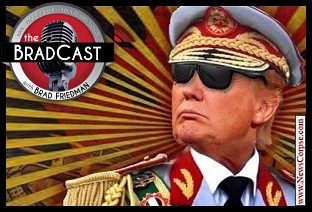 Banana Republican: Trump Shoots the Labor Statistics Messenger: 'BradCast' 8/5/25
Banana Republican: Trump Shoots the Labor Statistics Messenger: 'BradCast' 8/5/25 All's Fair in Love, War and, Apparently, Part-isan Gerrymandering: 'BradCast' 8/4/25
All's Fair in Love, War and, Apparently, Part-isan Gerrymandering: 'BradCast' 8/4/25 The Art of the Corrupt, Phony, Unlawful, Pretend Trade Deal: 'BradCast' 7/31/25
The Art of the Corrupt, Phony, Unlawful, Pretend Trade Deal: 'BradCast' 7/31/25 Battle Begins Against Trump EPA Climate Regulations 'Kill Shot': 'BradCast' 7/30/25
Battle Begins Against Trump EPA Climate Regulations 'Kill Shot': 'BradCast' 7/30/25 A Pu Pu Platter of Trump Corruption: 'BradCast' 7/29/25
A Pu Pu Platter of Trump Corruption: 'BradCast' 7/29/25 'Catastrophic' GOP Cuts to Medicaid, Medicare, ACA: 'BradCast' 7/28/25
'Catastrophic' GOP Cuts to Medicaid, Medicare, ACA: 'BradCast' 7/28/25
 VA GOP VOTER REG FRAUDSTER OFF HOOK
VA GOP VOTER REG FRAUDSTER OFF HOOK Criminal GOP Voter Registration Fraud Probe Expanding in VA
Criminal GOP Voter Registration Fraud Probe Expanding in VA DOJ PROBE SOUGHT AFTER VA ARREST
DOJ PROBE SOUGHT AFTER VA ARREST Arrest in VA: GOP Voter Reg Scandal Widens
Arrest in VA: GOP Voter Reg Scandal Widens ALL TOGETHER: ROVE, SPROUL, KOCHS, RNC
ALL TOGETHER: ROVE, SPROUL, KOCHS, RNC LATimes: RNC's 'Fired' Sproul Working for Repubs in 'as Many as 30 States'
LATimes: RNC's 'Fired' Sproul Working for Repubs in 'as Many as 30 States' 'Fired' Sproul Group 'Cloned', Still Working for Republicans in At Least 10 States
'Fired' Sproul Group 'Cloned', Still Working for Republicans in At Least 10 States FINALLY: FOX ON GOP REG FRAUD SCANDAL
FINALLY: FOX ON GOP REG FRAUD SCANDAL COLORADO FOLLOWS FLORIDA WITH GOP CRIMINAL INVESTIGATION
COLORADO FOLLOWS FLORIDA WITH GOP CRIMINAL INVESTIGATION CRIMINAL PROBE LAUNCHED INTO GOP VOTER REGISTRATION FRAUD SCANDAL IN FL
CRIMINAL PROBE LAUNCHED INTO GOP VOTER REGISTRATION FRAUD SCANDAL IN FL Brad Breaks PA Photo ID & GOP Registration Fraud Scandal News on Hartmann TV
Brad Breaks PA Photo ID & GOP Registration Fraud Scandal News on Hartmann TV  CAUGHT ON TAPE: COORDINATED NATIONWIDE GOP VOTER REG SCAM
CAUGHT ON TAPE: COORDINATED NATIONWIDE GOP VOTER REG SCAM CRIMINAL ELECTION FRAUD COMPLAINT FILED AGAINST GOP 'FRAUD' FIRM
CRIMINAL ELECTION FRAUD COMPLAINT FILED AGAINST GOP 'FRAUD' FIRM RICK SCOTT GETS ROLLED IN GOP REGISTRATION FRAUD SCANDAL
RICK SCOTT GETS ROLLED IN GOP REGISTRATION FRAUD SCANDAL VIDEO: Brad Breaks GOP Reg Fraud Scandal on Hartmann TV
VIDEO: Brad Breaks GOP Reg Fraud Scandal on Hartmann TV RNC FIRES NATIONAL VOTER REGISTRATION FIRM FOR FRAUD
RNC FIRES NATIONAL VOTER REGISTRATION FIRM FOR FRAUD EXCLUSIVE: Intvw w/ FL Official Who First Discovered GOP Reg Fraud
EXCLUSIVE: Intvw w/ FL Official Who First Discovered GOP Reg Fraud GOP REGISTRATION FRAUD FOUND IN FL
GOP REGISTRATION FRAUD FOUND IN FL

































